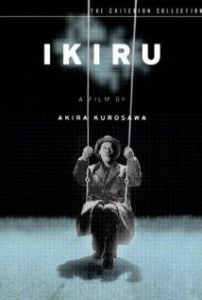 I love Kursoawa films. And Netflix on the Roku box makes it easy to dive deeply in this master’s work. Among his less well-known films (and one of the few to be set in modern times) is Ikiru (“to live”) which I watched for the first time this weekend. IMDB has a good synopsis of the movie and plot here.
I love Kursoawa films. And Netflix on the Roku box makes it easy to dive deeply in this master’s work. Among his less well-known films (and one of the few to be set in modern times) is Ikiru (“to live”) which I watched for the first time this weekend. IMDB has a good synopsis of the movie and plot here.
What I can’t get out of my head days after watching the film isn’t the somewhat maudlin triumph of Watanabe-san over his mortality. Rather, it’s how the film illuminates Japanese mores and a culture that — some 60 years later — still reflexively sweeps issues under the rug and suppresses any individuality at all.
In the film, Watanabe-san is the ultimate bureaucrat, dispensing with the real concerns of people without looking up from his desk. His doctors lie to him about his cancer, despite his pleas for honesty. And, in the most astonishing scene of all — which consists of the last 30 minutes of the film — nobody speaks the truth at Watanabe-san’s wake until the big shots have left and they are all stinkin’ blind drunk on sake. Meanwhile, the family sits by stoically as increasingly drunken theory after theory finally gives way to the truth. In a collective stupor, everyone agrees to remember their epiphany tomorrow, only to immediately punish the one who holds on to that commitment.
If you want to know how it is possible that TEPCO wasn’t ready for the disaster at Fukushima Daiichi, why the government at first didn’t tell more people to evacuate, why just today, finally, the government raised the level of the disaster to the maximum, why we will discover over time that much more radiation has been released than predicted, just watch this beautifully acted, stunningly photographed film.
Ikiru doesn’t look modern. The film has no special effects. It’s subtitled. It’s in black and white. But what it does do (in addition to being compelling on its face) is inadvertently and clearly explain the Japanese mindset to outsiders. That mindset is as powerful today as it was in post-war, occupied Japan. And it’s the reason that Japanese society is unable to face the reality of Fukushima Daiichi.
The message from 1952 is as cogent today as it must have been then: a society which systematically suppresses truth and individuality has only itself to blame for its inability to progress.
Leave a Reply